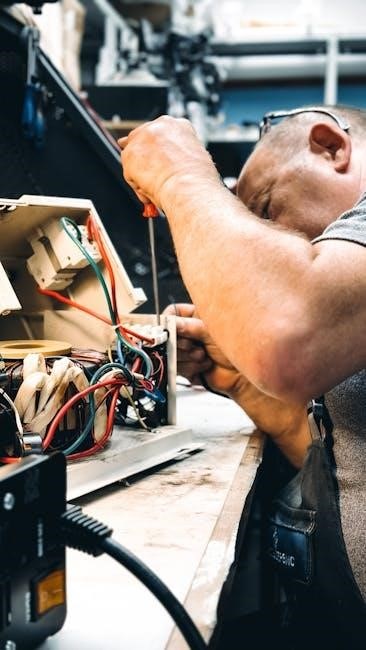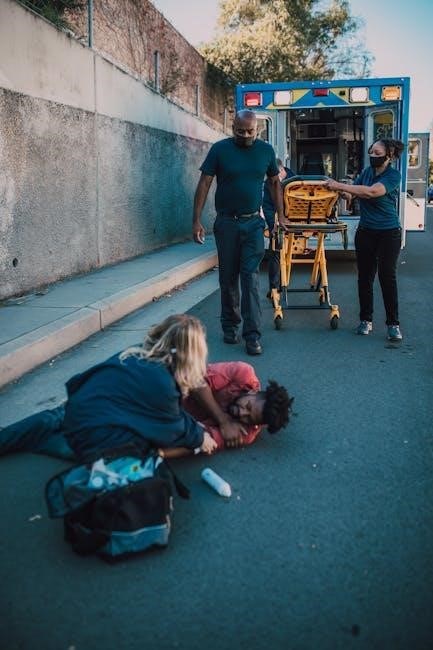A Virginia Medical Power of Attorney (MPOA) is a legal document allowing you to appoint an agent to make healthcare decisions if you become incapacitated․
Definition and Purpose
A Virginia Medical Power of Attorney (MPOA) is a legal document that empowers an agent to make healthcare decisions on your behalf if you become mentally or physically incapacitated․ It ensures your medical wishes are carried out according to your preferences․ The purpose of an MPOA is to appoint a trusted individual to act in your best interest, making decisions about treatments, medications, and end-of-life care; This document is a type of advance directive, allowing you to maintain control over your healthcare even when you cannot communicate․ It is durable, meaning it remains in effect until revoked or death․
Importance of Having a Medical Power of Attorney in Virginia
Having a Medical Power of Attorney (MPOA) in Virginia is crucial for ensuring your healthcare wishes are honored if you become incapacitated․ It prevents family disputes by designating a trusted agent to make decisions․ An MPOA ensures you receive the medical care you desire, even if you cannot communicate․ It also protects your autonomy, allowing you to predefine your preferences for treatments, medications, and end-of-life care․ Without one, decisions may fall to state law or court-appointed guardians, potentially conflicting with your values․ This document is a proactive step in maintaining control over your healthcare, offering peace of mind for you and your loved ones․
Legal Framework
Virginia’s legal framework for Medical Power of Attorney is established under the Healthcare Decisions Act, ensuring adherence to state laws and regulations governing healthcare decision-making authority․
Virginia Healthcare Decisions Act
The Virginia Healthcare Decisions Act governs the creation and execution of advance directives, including Medical Power of Attorney․ It ensures that individuals’ healthcare preferences are legally recognized, allowing designated agents to make decisions when the principal is incapacitated․ The Act sets forth the requirements for valid documentation, emphasizing clarity and specificity to protect both the principal and the agent․ It also aligns with ethical standards, ensuring that medical decisions respect the principal’s autonomy and best interests․ Compliance with this Act is essential for the enforceability of a Medical Power of Attorney in Virginia․
Relevant Laws and Regulations
In Virginia, the Medical Power of Attorney is governed by specific laws and regulations that ensure its validity and enforceability․ The Uniform Health-Care Decisions Act and the Virginia Code § 54․1-2984 provide the legal framework for advance directives․ These laws outline the requirements for creating, executing, and revoking a Medical Power of Attorney․ They also establish the rights and responsibilities of both the principal and the agent․ Compliance with these regulations is essential to ensure that the document is legally binding and recognized by healthcare providers․ Proper notarization, witness signatures, and clear language are critical components to meet these legal standards․

Types of Power of Attorney
In Virginia, common types include Medical Power of Attorney, Springing Durable Power of Attorney, and distinctions between Medical and Financial Power of Attorney for tailored authority․
Medical Power of Attorney
A Medical Power of Attorney (MPOA) in Virginia is a legal document that authorizes an appointed agent to make healthcare decisions on behalf of the principal if they become incapacitated․ This document ensures that the principal’s medical preferences are honored, even when they cannot communicate․ The agent can consent to or refuse treatments, access medical records, and make end-of-life decisions․ It is crucial for individuals to carefully choose their agent and specify any restrictions․ Completing the MPOA form, often available as a downloadable PDF, ensures compliance with Virginia’s Healthcare Decisions Act, providing a clear framework for healthcare directives․
Springing Durable Power of Attorney
A springing durable power of attorney becomes effective only when a specific condition occurs, such as the principal’s mental incapacitation․ This type of POA allows someone to act on your behalf exclusively if you are unable to make decisions․ It is ideal for individuals who wish to maintain control over their affairs until they can no longer do so․ Unlike a regular durable POA, which is immediately effective, a springing POA delays the agent’s authority until the triggering event․ This ensures that your autonomy is preserved while providing a safety net for future incapacity․ It is often used alongside a medical POA to address healthcare-specific decisions․
Difference Between Medical and Financial Power of Attorney
A medical power of attorney grants an agent authority to make healthcare decisions on your behalf, such as choosing treatments or accessing medical records․ In contrast, a financial power of attorney allows an agent to manage your financial matters, like paying bills or handling investments․ While both documents are crucial, they serve distinct purposes․ A medical POA focuses solely on healthcare, ensuring your wishes are honored if you cannot communicate․ A financial POA, however, covers monetary and property-related decisions․ Both can be tailored to your needs, but they are separate legal instruments․ Understanding the differences helps ensure your autonomy is protected in both health and finances․ Each requires careful consideration to appoint the right agent for the specific role․
Key Components of the Document
The document outlines the principal and agent details, scope of authority, special instructions, and signature and notarization requirements, ensuring clarity and legality in healthcare decision-making․
Principal and Agent Information
The Virginia Medical Power of Attorney requires detailed information about the principal (the person granting authority) and the agent (the person making decisions)․ The principal must provide their full name, address, and date of birth, while the agent’s details include name, address, and contact information․ This section ensures clear identification and accountability․ Additional space is often provided for alternate agents in case the primary agent is unable to act․ Accurate and complete information is crucial to avoid legal complications․ Witnesses and notarization further validate the document’s authenticity, ensuring the principal’s wishes are respected and enforced․ Properly filled, this section guarantees clarity and legitimacy in healthcare decision-making․
Scope of Authority
The Virginia Medical Power of Attorney (MPOA) outlines the scope of authority granted to the agent, enabling them to make healthcare decisions on behalf of the principal․ This includes consenting to or refusing medical treatments, surgeries, or medications․ The agent can also access the principal’s medical records and communicate with healthcare providers to ensure informed decisions․ Additionally, the agent may coordinate care, manage rehabilitation, and make end-of-life decisions if specified․ The principal can tailor the scope, limiting or expanding the agent’s powers as desired․ This section ensures clarity on the agent’s role and responsibilities, aligning with Virginia’s legal framework and the principal’s wishes․ Properly defined, it safeguards the principal’s autonomy and well-being․
Special Instructions or Restrictions
The Virginia Medical Power of Attorney allows the principal to include special instructions or restrictions that guide the agent’s decision-making․ These instructions may outline specific medical treatments the principal approves or refuses, such as life-sustaining measures, surgeries, or medications․ The principal can also specify preferences for care settings, such as home healthcare or hospice care․ Additionally, instructions may address religious or moral beliefs that should influence decisions․ These restrictions ensure the agent adheres to the principal’s values and wishes, even when the principal cannot communicate․ Including such details provides clarity and helps the agent make decisions aligned with the principal’s desires, ensuring autonomy and peace of mind․
Signature and Notarization Requirements
The Virginia Medical Power of Attorney must be signed by the principal in the presence of a notary public to ensure its validity․ The principal’s signature confirms their consent to the document’s terms․ A notary public witnesses the signing and verifies the principal’s identity, adding legal authenticity․ Some forms may also require one or more witnesses, though this varies depending on the document․ The principal must have legal capacity at the time of signing․ The notarization process involves the notary acknowledging the principal’s voluntary execution of the document․ Proper signature and notarization ensure the POA is enforceable under Virginia law, protecting both the principal and the agent․

Obtaining the Virginia Medical Power of Attorney Form
The Virginia Medical Power of Attorney form can be obtained from VA healthcare providers or downloaded as a PDF from official VA websites, ensuring easy access for all residents․
VA Form 10-5345
VA Form 10-5345 is a standardized document used for designating a Medical Power of Attorney in Virginia․ It allows individuals to appoint an agent to make healthcare decisions on their behalf if they become incapacitated․ This form is specifically designed to comply with Virginia’s Healthcare Decisions Act and ensures that the agent has the authority to act in the principal’s best interest․ The form can be obtained from VA healthcare providers or downloaded as a PDF from official VA websites․ It is part of Virginia’s Advance Healthcare Directive and is widely recognized as a legally binding document in the state․

Downloading the PDF Form
The Virginia Medical Power of Attorney PDF form can be conveniently downloaded from official VA websites․ Visit http://www4․va․gov/vaforms/medical/pdf/vha-10 to access the form․ This document is part of Virginia’s Advance Healthcare Directive and is legally recognized․ Once downloaded, you can print the form and complete it by hand using black ink, as required for legal documents․ The PDF format ensures that the form maintains its professional layout and readability․ Downloading the form is a straightforward process, allowing individuals to efficiently prepare their Medical Power of Attorney without delays․ Ensure the form is filled out accurately to guarantee its validity under Virginia law․
Where to Get the Form
The Virginia Medical Power of Attorney form can be obtained from several reliable sources․ Official government websites, such as those maintained by the Virginia Secretary of State or Department of Health, often provide downloadable PDF versions of the form․ Additionally, veterans or those associated with the VA can access VA Form 10-5345 through VA healthcare providers or the VA’s official website․ Legal aid organizations and elder care resources may also offer the form as part of their services․ Consulting with a lawyer or legal firm in Virginia can provide access to the form, and some may offer assistance in completing it․ Reliable legal form websites may also offer the document, though it’s important to verify their compliance with Virginia state laws․ Hospitals or healthcare providers in Virginia might provide the form as part of their advance care planning services․ Ensuring the form’s authenticity and compliance with current Virginia statutes is crucial for its legal validity․
Completing the Form
Download the Virginia Medical Power of Attorney PDF, fill it out by hand in black ink or use a fillable PDF, and ensure notarization for validity․
Step-by-Step Guide
Download the Virginia Medical Power of Attorney PDF form from the VA website or obtain it from a VA healthcare provider․
Carefully review the document to understand its purpose and requirements․
Fill out the form by hand using black ink or use a fillable PDF version if available․
Provide all required information, including your name, address, and the agent’s details․
Specify the scope of authority granted to your agent, including any restrictions or special instructions․
Sign the document in the presence of a notary public to ensure its validity․
Have the notary witness and stamp the document according to Virginia state laws․
Distribute copies to your agent, healthcare providers, and relevant parties for their records․
Store the original document in a safe and accessible location․
Review and update the document as needed to reflect any changes in your preferences or circumstances․
Required Information
The Virginia Medical Power of Attorney form requires specific details to ensure its validity and effectiveness․ You must include your full name, address, and date of birth as the principal․ The agent’s name, address, and contact information are also mandatory․ The document should outline the scope of authority granted to the agent, such as decisions regarding medical treatments, surgeries, or end-of-life care․ Any special instructions or restrictions must be clearly stated․ The form must be signed by you and witnessed by a notary public, with your signature in black ink․ This ensures the document meets Virginia’s legal requirements and is recognized by healthcare providers․ Accuracy and completeness are crucial to prevent legal or medical complications․ Ensure all sections are filled out thoroughly to avoid delays or disputes in healthcare decision-making․ Properly executed, the document protects your rights and ensures your wishes are respected․
Filling Out the Form Correctly
Filling out the Virginia Medical Power of Attorney form accurately is essential to ensure its validity and effectiveness․ Use black ink to complete the document, as this is a common legal requirement․ Begin by carefully entering your name, address, and date of birth in the designated sections․ Clearly outline the powers you are granting to your agent, such as decision-making authority for medical treatments or life-sustaining interventions․ If you wish to impose restrictions, specify them in detail․ Initial each section to confirm your choices․ Ensure all signatures, including the notary’s, are completed properly․ Double-check for any errors or omissions before finalizing․ This ensures the document is legally binding and reflects your wishes accurately․ Consulting a legal professional can help prevent mistakes and ensure compliance with Virginia state laws․ Proper execution guarantees your agent can act on your behalf without delays or disputes․ Attention to detail is critical to safeguard your healthcare rights․

Execution Requirements
The Virginia Medical Power of Attorney must be signed in the presence of a notary public and two witnesses to ensure legal validity and enforceability under state law․
Notarization Process
The notarization process for a Virginia Medical Power of Attorney involves signing the document in the presence of a licensed notary public․ The notary verifies the principal’s identity and witnesses the signature․ This step ensures the document’s authenticity and legal validity․ The notary will stamp or seal the form, confirming the principal’s voluntary execution․ It is crucial to follow this process to prevent any legal challenges․ The notary’s role is to act as an impartial witness, ensuring the principal understands the document’s purpose․ Proper notarization is essential for the Medical POA to be recognized under Virginia law․ This step is a critical part of the execution process․
Witness Requirements
In Virginia, a Medical Power of Attorney requires the signatures of two witnesses to ensure the document’s validity․ Witnesses must be adults and cannot be the agent or alternate agents named in the document․ Additionally, they should not have any financial interest in the principal’s estate․ Witnesses must observe the principal signing the document and confirm that the principal appears to understand the nature of the document and is acting voluntarily․ Their signatures serve as verification of the principal’s capacity and willingness to execute the Medical POA․ This step is crucial for upholding the document’s legal enforceability in Virginia courts․
Signature Requirements
The principal and the designated agent must sign the Virginia Medical Power of Attorney document․ The principal’s signature is essential to validate the document, indicating their consent to the arrangement․ The agent’s signature confirms their acceptance of the responsibilities outlined․ Both signatures must be dated and witnessed to ensure authenticity․ The document may also require notarization, although Virginia law does not mandate it for Medical POAs․ Proper signature execution ensures the document’s enforceability, providing a clear and legally binding directive for healthcare decisions․ This step is critical for upholding the principal’s wishes and ensuring the agent’s authority is recognized by healthcare providers․

Role and Responsibilities of the Agent
The agent has the authority to make healthcare decisions for the principal, ensuring their wishes are honored․ They must act in the principal’s best interest and can access medical records to make informed decisions․
Powers of the Agent
The agent appointed in a Virginia Medical Power of Attorney has the authority to make critical healthcare decisions on behalf of the principal․ This includes consenting to or refusing medical treatments, selecting healthcare providers, and accessing medical records․ The agent’s powers are specifically limited to healthcare decisions, ensuring they act in the principal’s best interest․ They must follow any instructions or restrictions outlined in the document․ If the principal is incapacitated, the agent’s authority becomes effective, allowing them to advocate for the principal’s medical preferences․ The agent’s role is to make decisions that align with the principal’s wishes, ensuring their autonomy is respected․ This legal designation provides clarity and protection for both parties involved․
Decision-Making Authority
In a Virginia Medical Power of Attorney, the agent holds the legal authority to make healthcare decisions on behalf of the principal when they are unable to do so․ This authority is specifically outlined in the document and typically includes decisions about treatments, medications, and medical procedures․ The agent’s decision-making power begins only when the principal is incapacitated, as defined by the document․ The agent must act in accordance with the principal’s known wishes, preferences, and best interests․ If the principal’s wishes are unknown, the agent is expected to make decisions that align with their perceived quality of life․ This authority ensures the principal’s autonomy is respected and their medical needs are addressed effectively․
Access to Medical Records
The Virginia Medical Power of Attorney grants the designated agent access to the principal’s medical records, ensuring they can make informed healthcare decisions․ This authority is typically explicitly stated in the document and aligns with federal and state laws, including HIPAA regulations․ The agent’s access allows them to review medical histories, treatment plans, and other relevant health information․ This provision is crucial for the agent to carry out their responsibilities effectively and make decisions that reflect the principal’s best interests․ The document often includes a HIPAA waiver, further facilitating access to necessary medical information․ This ensures the agent can act knowledgeably and in accordance with the principal’s wishes․
Acting in the Principal’s Best Interest
An agent under a Virginia Medical Power of Attorney must act in the principal’s best interest, adhering to their wishes and values․ This duty ensures decisions align with the principal’s preferences, even when they cannot communicate․ The agent is legally bound to prioritize the principal’s well-being, considering their medical needs and quality of life․ They must avoid conflicts of interest and act with the utmost honesty․ If the principal’s wishes are unknown, the agent makes decisions based on what a reasonable person would choose․ This fiduciary responsibility is a cornerstone of the Medical Power of Attorney, safeguarding the principal’s autonomy and dignity․ The agent’s role is both ethical and legal, ensuring the principal’s voice is heard through their actions․
Revoking the Power of Attorney
Revoking a Virginia Medical Power of Attorney requires a written document, often notarized, and notification to the agent and relevant parties to ensure termination of authority․
How to Revoke the Document
Revoking a Virginia Medical Power of Attorney requires a written document, often notarized, expressing your intent to terminate the agreement․ Notify the agent and healthcare providers in writing to ensure the revocation is recognized․ You may also create a new POA if desired․ Deliver the revocation document to the agent and relevant parties, such as medical institutions, to confirm the termination․ Destroy all copies to prevent accidental use․ The agent’s authority ends upon proper revocation, restoring your control over medical decisions․ This process ensures clarity and protects your rights, allowing you to manage your healthcare preferences effectively․
Notifying the Agent and Relevant Parties
After revoking your Virginia Medical Power of Attorney, it is crucial to notify the agent and all relevant parties in writing․ Provide a signed, notarized revocation document to the agent, healthcare providers, and any institutions that may have a copy of the original POA․ This ensures they are aware of the termination and cease acting under the revoked document․ Verbal communication is insufficient, as written proof is required to prevent misunderstandings․ Failure to notify may result in the agent continuing to act on your behalf, potentially leading to legal complications․ Clear communication protects your rights and ensures your wishes are respected․

Frequently Asked Questions
Common inquiries about Virginia Medical Power of Attorney include whether a lawyer is needed for creation, if changes can be made post-signing, and the consequences of lacking one․
- Do I Need a Lawyer to Create a Medical Power of Attorney?
- Can I Make Changes to the Form After Signing?
- What Happens if I Become Incapacitated Without a Medical POA?
Seeking legal advice ensures clarity and compliance with Virginia’s Healthcare Decisions Act, protecting your rights and wishes effectively․
Do I Need a Lawyer to Create a Medical Power of Attorney?
In Virginia, you are not required to hire a lawyer to create a Medical Power of Attorney (MPOA)․ However, consulting an attorney is highly recommended to ensure the document meets legal standards and aligns with your specific needs․ A lawyer can guide you through the process, clarify complexities, and help you understand the implications of your decisions․ While the Virginia Healthcare Decisions Act allows you to use a pre-approved form like VA Form 10-5345, legal expertise can prevent potential issues and ensure your wishes are clearly expressed․ Additionally, proper notarization and witness requirements must be followed for the document to be valid․
Can I Make Changes to the Form After Signing?
Once a Virginia Medical Power of Attorney (MPOA) is signed and notarized, making changes requires careful consideration․ You can revoke or amend the document, but it must be done in writing․ Any modifications should be signed, notarized, and communicated to your agent and relevant parties․ It’s essential to follow legal procedures to ensure the changes are recognized․ If you alter the original document after signing, it may lead to confusion or invalidate the POA․ Consulting a lawyer is advisable to ensure amendments are executed correctly and maintain the document’s validity․ Always keep your agent informed of any updates to avoid potential conflicts or misunderstandings․
What Happens if I Become Incapacitated Without a Medical POA?
If you become incapacitated without a Medical Power of Attorney (MPOA), your family may face legal challenges in making healthcare decisions for you․ In Virginia, without an MPOA, the court may appoint a guardian to oversee your medical care, which can be a lengthy and costly process․ This could lead to delays in critical decision-making and potential conflicts among family members․ Having an MPOA ensures your chosen agent can act promptly and in accordance with your wishes, avoiding unnecessary legal interventions and ensuring your healthcare preferences are respected․ It’s crucial to establish an MPOA to maintain control over your medical future and protect your loved ones from additional stress․

Additional Resources
Additional resources include online legal platforms, community centers, and Virginia Advance Healthcare Directive guides․ These provide comprehensive support and guidance for creating a Medical POA․
Virginia Advance Healthcare Directive
The Virginia Advance Healthcare Directive is a comprehensive document combining a Medical Power of Attorney and a Living Will․ It allows individuals to outline their end-of-life preferences and appoint an agent to make healthcare decisions․ This directive ensures that personal wishes are respected if one becomes incapacitated․ It complies with the Virginia Healthcare Decisions Act, providing legal authority for agents to act on behalf of the principal․ The directive can be downloaded as a PDF from various legal resources or obtained through VA healthcare providers․ Completing it requires careful consideration and often legal consultation to ensure all aspects are covered․
Living Will and Medical POA Combination
A Living Will and Medical Power of Attorney (POA) can be combined into a single document, providing a comprehensive approach to advance healthcare planning․ The Living Will outlines specific medical treatments a person does or does not want at the end of life, while the Medical POA appoints an agent to make broader healthcare decisions․ This combination ensures that both specific wishes and general decision-making authority are addressed․ In Virginia, this combined document must comply with the Healthcare Decisions Act and is often available as a downloadable PDF for ease of use․ It offers peace of mind by ensuring preferences are honored and decisions are managed effectively․
Where to Get Help or More Information
For assistance or additional details about Virginia’s Medical Power of Attorney, visit the Virginia Department of Aging and Rehabilitative Services or consult with an elder law attorney․ The VA healthcare providers also offer resources, including the VA Form 10-5345, which can be downloaded from their official website․ Local legal aid organizations and community centers often provide workshops and guides․ Online platforms, such as legal advisory websites, offer downloadable PDF templates and step-by-step instructions․ These resources ensure individuals can create a valid MPOA that aligns with state laws and meets their specific needs, providing clarity and reassurance throughout the process․


